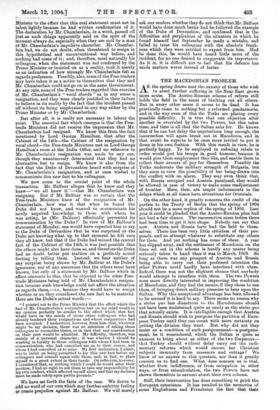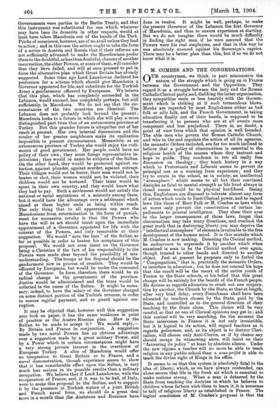THE MACEDONIAN PROBLEM.
Al_3 the spring draws near the anxiety of those who wish to avert further suffering in the Near East grows more acute. The Austro-Russian scheme of reform still holds the field in the sense of blocking out all others. But in every other sense it seems to be dead. It has practically come to nothing but a reformed gendarmerie, and in the way even of this the Turks are placing every possible difficulty. It is true that one objection after another is overruled by the two Powers, but this takes time, and time is all that the Sultan asks for. He knows that if he can but delay the negotiations long enough, the iusurrection will again break out in Macedonia, and in that event he expects to be once more invited to put it down in his own fashion. With this result in view, he is perfectly happy. To be employed in reducing rebels to order would put his troops in good humour, because it would give them employment they like, and enable them to collect their arrears of pay for themselves. Possibly the Turks underrate the military strength of Bulgaria, but they seem to view the possibility of her being drawn into the conflict with no alarm. They may even think that, with Russia occupied and Austria paralysed, they would be allowed in case of victory to make some readjustment of frontier. Here, then, are ample inducements to the delays which at all times have attractions for Orientals.
On the other hand, it greatly concerns the credit of the parties to the Treaty of Berlin that the spring of 1904 should not be a mere replica of the spring of 1903. Last year it could be pleaded that the Austro-Russian plan had not had a fair chance. The insurrection came before there had been time to get it into shape. Nobody can say that now. Austria and Russia have had the field to them- selves. There has been very little criticism of their pro- posals, and no attempt whatever to substitute any others for them. And yet nothing has come of them. A year has slipped away, and the settlement of Macedonia on the lines set out in the scheme is hardly any nearer being seriously taken in hand than it was in March, 1908. So long as there was any prospect of Austria and Russia being able to carry out their professed intention the other Powers could hardly have interfered with them. Indeed, there was not the slightest chance that anybody would attempt to interfere with them. The two Powers were more directly interested in improving the condition of Macedonia, and they had the means, if they chose to use them, of bringing direct military pressure to bear upon the Sultan. Why this exceptional advantage has been allowed to lie unused it is hard to say. There seems no reason why a status quo less disastrous to the Macedonians should not have been maintained quite as easily as the status quo that actually exists. It is intelligible enough that Austria and Russia should wish to postpone the partition of Euro- pean Turkey until they can count with more certainty on getting the division they want. But why did not they insist as a condition of such postponement—a postpone- ment, be it remembered, which the Sultan is quite as anxious to bring about as either of the two Emperors— that Turkey should without delay carry out the rudi- mentary reforms which would ensure her Christian subjects immunity from massacre and outrage? We know of no answer to this question, nor does it greatly concern us to find one. What does concern us is that, whether from indifference, or from occupation in other ways, or from miscalculation, the two Powers have not shown themselves in earnest about their own scheme.
Still, their intervention has done something to prick the European conscience. It has recalled to the memories of some Englishmen and Frenchmen the fact that their Governments were parties to the Berlin Treaty, and that this instrument was substituted for one which, whatever may have been its demerits in other respects, would at least have taken Macedonia out of the hands of the Turk. Pricks of conscience, however, are of no avail unless they lead to action ; and in this case the action ought to take the form of a notice to Austria and Russia that if their reforms are not sufficiently advanced to make the Macedonians prefer them to the doubtful, or less than doubtf u I, chances of another insurrection, the other Powers, or some of them, will consider that they have failed, and will at once proceed to put in force the alternative plan which Great Britain has already suggested. Some time ago Lord Lansdowne declared his preference for a scheme which should give Macedonia a Governor appointed for life, and substitute for the Turkish Army a gendarmerie officered by Europeans. We believe that this plan, which has completely succeeded in the Lebanon, would succeed, less completely perhaps, but still sufficiently, in Macedonia. We do not say that the cir- cumstances of the two countries are identical. The Lebanon does not probably look beyond the present ; Macedonia looks to a future in which she will play a more distinguished part than that of an autonomous province of Turkey. But this grander future is altogether out of her reach at present. Her own internal dissensions and the rivalry of her greater neighbours make its realisation impossible in present circumstances. Meanwhile, as an autonomous province of Turkey she would enjoy the rudi- ments of good government. Her people could have no policy of their own ; they must forego representative in- stitutions; they would in name be subjects of the Sultan. On the other hand, they would be protected against ex- tortion, against plunder, against murder, against outrage. Their villages would not be burnt, their men would not be beaten or shot, their women would not. be violated, their children would not be tortured. Their taxes would be spent in their own country, and they would know what they had to pay. Such a settlement would not satisfy the national or racial aspirations of a minority among them, but it would have the advantage over a settlement which aimed at these higher ends in being within reach. The only thing that to all appearance can save the Macedonians from extermination in the form of punish- ment for successive revolts is that the Powers who have the will to act should insist upon the immediate appointment of a Governor, appointed for life with the consent of the Powers, and only removable at their suggestion. We would "save the face" of the Sultan as far as possible in order to hasten his acceptance of this proposal. We would not even insist on the Governor being a Christian if the fact of his responsibility to the Powers were made clear beyond the possibility of mis- understanding. The troops at his disposal should be the gendarmerie now in process of creation. They would be officered by Europeans, but would be under the command of the Governor. In form, therefore, there would be no radical change in the government of the province. Justice would be administered and the taxes would be collected in the name of the Sultan. It might be neces- sary, indeed, to have the salary of the Governor charged on some distinct portion of the Turkish revenue, in order to ensure regular payment, and so guard against cor- ruption.
It may be objected that, however well this suggestion may look on paper, it has the same weakness in point of practice as the Austro-Russian plan. How is the Sultan to be made to accept it ? We would reply,— By Britain and France in conjunction. A suggestion made by two naval Powers has an obvious advantage over a suggestion made by a great military Power, and by a Power which in certain circumstances might have a very strong private interest in the overthrow of European Turkey. A slice of Macedonia would offer no temptation to Great Britain or to France, and a naval demonstration, though experience seems to show that it has considerable effect upon the Sultan, is very much less serious in its possible results than a military occupation. We believe that if Lord Lansdowne, with the co-operation of France, and, if it was to be had, of Italy, were to make this proposal to the Sultan, and to support it by the presence in Turkish waters of a joint British 8,nd French naval force, we should do a great deal more in a month than the Austrians and Russians have done in twelve. It might be well, perhaps, to make the present Governor of the Lebanon the first Governor of Macedonia, and thus to ensure experience at starting. But we do not imagine there would be much difficulty in finding the right man if he were assured that the Powers were his real employers, and that in this way he was absolutely ensured against his Sovereign's caprice. There may be a better plan than this, but if so we do not know what it is.











































 Previous page
Previous page